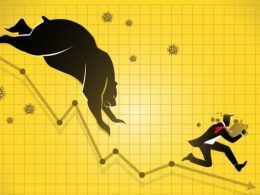by Stephen H. Dover, CFA, Franklin Templeton Investments
Our Head of Equities, Stephen Dover, gives his take on how COVID-19 has accelerated economic changes and explains what may have caused the stock markets’ second-quarter ascent.
There is a disconnect between the stock markets and Main Street. Stock prices remain elevated despite economic data indicating deep economic harm. The fiscal, monetary and political responses to the COVID-19 crisis globally have led to a world awash with liquidity and short-term fiscal stimulation. Much of that liquidity has gone into the stock markets, explaining a great deal of the markets’ ascent in the second quarter.
The COVID-19 pandemic seems to have accelerated changes that might have otherwise taken a decade or more. Please read our Global Investment Outlook where we discuss many factors currently affecting the markets, including:
- Waves of COVID-19 infections, historic unrest around racial injustice, the upcoming US elections, growing tension between the United States and China.
- Examples of rapid industry shifts include: work from anywhere, remote sports and entertainment, greater reliance on restaurant take-out and delivery services, increasing industry consolidations, supply chains returning domestically, bankruptcies of many small—especially retail—businesses, and the move of urban digital-era hubs to lower-cost areas.
- Globally, while low interest rates, fiscal stimuli, and easily available financing have helped keep alive some weak companies, debt is not a substitute for lost revenues and profits.
- The six FAAANM stocks (Facebook, Apple, Alphabet, Amazon, Netflix, and Microsoft) appreciated 263.82% over the past five years, about one-third of the S&P 500 Index’s return. The rest of the US equity market (S&P 500 Index without the FAAANMs) appreciated only 35.68%.1
- The US markets have generally outperformed overseas markets. However, if you exclude the FAAANM stocks from US indexes, the US equity markets have performed about in line with overseas’ markets, and any difference is from currency moves.
The key question looking ahead is whether the stock markets will continue to climb based on monetary and fiscal responses or whether something could make equity markets unwind. I continue to believe that stock market and economic fundamentals will not remain disconnected forever. I think companies that will do well over time will have: clear business strategies, economic moats, workforce diversity, attention to Environmental, Social and Governance (ESG) factors, returns above the cost of capital, strong balance sheets, positive cash flow, and skills leveraging technology.
Important Legal Information
This material is intended to be of general interest only and should not be construed as individual investment advice or a recommendation or solicitation to buy, sell or hold any security or to adopt any investment strategy. It does not constitute legal or tax advice. The views expressed are those of the investment manager and the comments, opinions and analyses are rendered as at 16 July 2020, and may change without notice. The information provided in this material is not intended as a complete analysis of every material fact regarding any country, region or market.
The companies and/or case studies shown herein are used solely for illustrative purposes; any investment may or may not be currently held by any portfolio advised by Franklin Templeton. Past performance does not guarantee future results.
Data from third party sources may have been used in the preparation of this material and Franklin Templeton (“FT”) has not independently verified, validated or audited such data. FT accepts no liability whatsoever for any loss arising from use of this information and reliance upon the comments, opinions and analyses in the material is at the sole discretion of the user.
Products, services and information may not be available in all jurisdictions and are offered outside the U.S. by other FT affiliates and/or their distributors as local laws and regulation permits. Please consult your own professional adviser or Franklin Templeton institutional contact for further information on availability of products and services in your jurisdiction.
Issued in the U.S. by Franklin Templeton Distributors, Inc., One Franklin Parkway, San Mateo, California 94403-1906, (800) DIAL BEN/342-5236, franklintempleton.com—Franklin Templeton Distributors, Inc. is the principal distributor of Franklin Templeton U.S. registered products, which are not FDIC insured; may lose value; and are not bank guaranteed and are available only in jurisdictions where an offer or solicitation of such products is permitted under applicable laws and regulation.
CFA® and Chartered Financial Analyst® are trademarks owned by CFA Institute.
What Are the Risks?
All investments involve risks, including possible loss of principal. The value of investments can go down as well as up, and investors may not get back the full amount invested. Stock prices fluctuate, sometimes rapidly and dramatically, due to factors affecting individual companies, particular industries or sectors, or general market conditions. Value securities may not increase in price as anticipated, or may decline further in value. To the extent a portfolio focuses on particular countries, regions, industries, sectors or types of investment from time to time, it may be subject to greater risks of adverse developments in such areas of focus than a portfolio that invests in a wider variety of countries, regions, industries, sectors or investments. Actively managed strategies could experience losses if the investment manager’s judgment about markets, interest rates or the attractiveness, relative values, liquidity or potential appreciation of particular investments made for a portfolio, proves to be incorrect. There can be no guarantee that an investment manager’s investment techniques or decisions will produce the desired results.
______________________________
1. Source FactSet, as at 30 June 2020. Indices are unmanaged and one cannot directly invest in them. They do not include fees, expenses or sales charges. Past performance is not an indicator or guarantee of future results.
This post was first published at the official blog of Franklin Templeton Investments.













